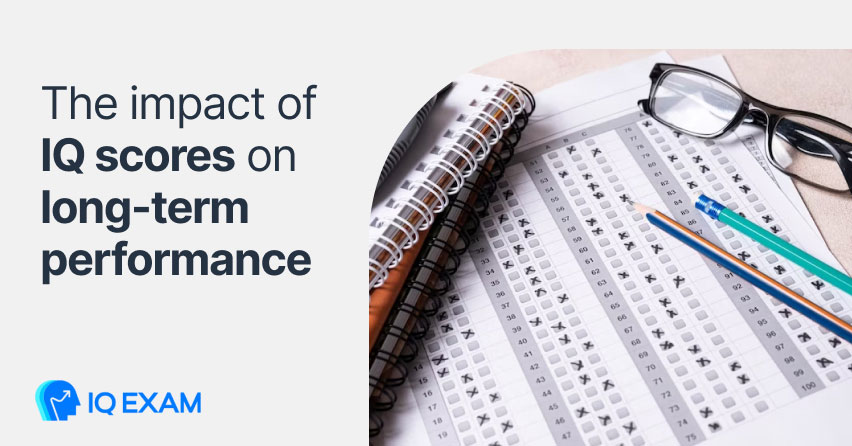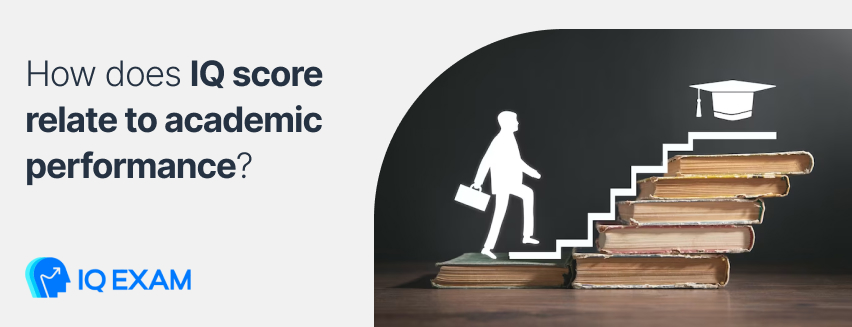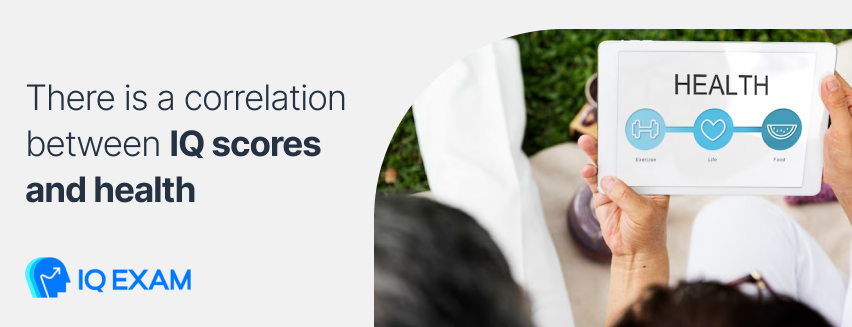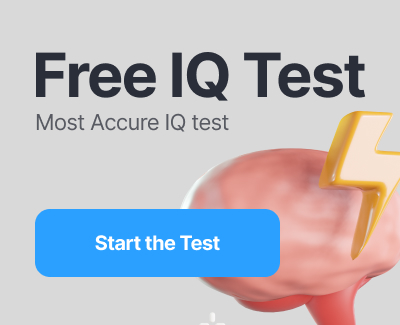
Do you think IQ tests are useful?
There is an assumption that people with high IQs will be successful in life. Many studies show that a high IQ can’t guarantee an individual’s academic, financial, and personal success.
In this article, we will discuss the impact of IQ scores on different aspects of live performance, such as personal, academic, and work performance.
IQ scores were first designed to identify children with special needs in school, and their application was changed over time. Today, IQ tests are mainly used for identifying people with a high intelligence level by comparing them to people with average IQs.
IQ score can’t predict a person’s life outcomes or whether they will be successful in life, but it can predict academic success reliably. Studies also concluded that people with high IQs would be more successful at their jobs.
On the other hand, in some cases, everything can go in another direction. Some researchers suggested that children with a high level of IQ are vulnerable to getting depressed and isolated compared to other children with lower IQ. These children need extra support and attention to perform well at school and the workplace.
IQ tests usually have two critical sections: Verbal and performance. Performance Intelligence Quotient (PIQ) is a score gained from different tests from Wechsler Intelligence scales that evaluate your intellectual and nonverbal skills. Performance IQ measures other skills, such as spatial reasoning, attention to detail, and visual skills.
How does IQ score relate to academic performance?

Intelligence level can have an impact on academic performance, but there are some limitations with IQ scores in predicting academic performance. Some researches focus on the effect of IQ score on an individual’s academic performance, but the findings still need to be more consistent.
On the other hand, IQ scores are the most common method for evaluating an individual’s level of intelligence. IQ test scores are acquired from standard tests assessing your problem-solving skills, reasoning, and comprehension of new information.
IQ tests are designed unbiasedly for all ages, but still, they are not ideal because they can’t evaluate all types of intelligence or accurately predict people’s performance.
Different criterias can affect an individual’s IQ, such as motivation, family and financial situation, learning opportunities, etc. Therefore, cognitive abilities are not the only factor in measuring a person’s IQ score.
As a result, IQ scores have a remarkable role in people’s academic performance from childhood to adulthood. Knowing how IQ scores can impact a person’s performance at school or a higher level of education is essential.
IQ score impact on gifted children

IQ scores plays a significant role in the education performance of intelligent children because these tests primarily focus on their language skills, problem-solving skills, memory capacity, and spatial understanding.
Children with high IQ levels are more creative and social and can understand complicated topics faster than their peers. Therefore children with high intelligence can perform better in school and receive better exam grades.
Assessing IQ scores will help parents and teachers understand the child’s future academic performance. They can guide them through this path by providing the necessary instruction and guidance to choose the best major at the next academic level, leading to a successful career.
On the other hand, parents should know that not all children with higher IQs will start working in highly-skilled careers. Instead, many children with high IQs might have a set of interests and skills that let them choose different passions in their life.
IQ score impact on student placement
IQ scores can evaluate children’s mental abilities compared to their peers; therefore, they can help the student placement process and allow parents to apply the most proper education program for their children.
IQ scores can be used in different tests and assessments to evaluate the intelligence level of children. The main goal of organizing these assessments is that test observers can identify students who need more motivation so they can encourage them through standard motivational methods to improve their performance at school.
IQ score role in labeling students

IQ scores is generally used for identifying gifted children at school. Still, on the other hand, these scores have been criticized because of unreliably projecting a child’s cognitive abilities. The reason is that these scores project only a student’s intelligence level instead of the skills they will need for their future profession.
When a child takes an IQ test and gains an average or below average score, they can be labeled as “learning disabled,” As a result, they may receive less homework or easier homework than their peers.
IQ scores can be changed over time regarding the experiences and opportunities a child will face. It might be better that children wouldn’t know about their scores as they can use this labeling as an excuse and not study as hard as they can.
Intelligence can affect academic performance and help a child to reach a higher level of education, and education can also help children to become more intelligent. These two factors depend on each other, the children, and other environmental factors around them.
How does IQ score affect job performance?
Many studies suggest a correlation between IQ scores and job performance, so many employers use IQ tests to choose the best candidate. Because employers with higher IQs can earn more money than individuals with average IQs. Moreover, IQs can predict job performance and career opportunities more accurately.
IQ scores are essential for predicting an employee’s success in complex careers requiring specific skills, such as engineers, physicists, or neurosurgeons. But this doesn’t mean you can’t be successful at your job if you don’t have a high IQ. Other factors can determine your success in your chosen career.
- Outgoing and friendly personality
- Self-confidence
- Being open-minded to new experiences
- Management abilities
- Strong communication skills
As a result, IQ plays a significant role in an individual’s job performance, but many employers don’t give candidates a chance if they receive a low score on their IQ test. In many employment tests, an IQ test is the first step of the assessment, and the results are significant for the company or organization.
But how do IQ scores impact job performance, and why is it so crucial for employers?
There’s a strong correlation between IQ and outcomes at work
A job candidate with a high IQ score has more potential to accomplish organizational goals in the work environment. Employers believe they can offer a high-quality job performance, or there is a higher possibility that employees with high IQ can accomplish that compared to employees with average IQ. Employers hand over more complicated tasks and responsibilities to employees with high IQs, and they expect them to hand back these tasks with the highest quality.
Employees with high IQs have problem-solving skills
Employees with higher IQ scores can solve complicated problems and provide the appropriate solutions, and they like to be challenged. These employees will take risks and don’t play safe. They prefer to deal with complex issues rather than ordinary ones, which can improve their job performance.
Many businesses need employees with technical skills, and people with average IQs might face difficulties while dealing with complicated concepts. That is why employers prefer to hire people with high IQs because they have no problem comprehending technicalities.
Employees with IQ shows are independent
Hard-working teams are valuable for employers, but they also care about independent employees. Independence is an essential trait for employees because they are usually more creative, and this creativity can lead to company success.
Independent employees don’t need that much monitoring or supervision; they can still deliver the work expected from them with high quality when they are on their own, which is what many employers are looking for.
Employees with high IQs will improve on the job
Considering the opportunities and circumstances, we already discussed that IQ scores are not fixed and can increase over time. Employees with high IQs can improve faster because they can adapt to the work environment, handle complicated responsibilities, and level up the company status next to promoting themselves.
The correlation between IQ score and life outcomes
Many studies suggest that people with high IQs are expected to perform better in school and their jobs, and they can make more money, stay away from crime, and even live for more years.
Many online IQ tests claim they calculate intelligence and can even predict an individual’s success in life. But, most of these online tests are not designed based on proper research because many studies suggest that IQ is just one of the criteria that can affect a person’s success and affect an individual’s life outcomes.
It is not that IQ score doesn’t have any impact on people’s success, but it is not the only formula for reaching success as many more factors are needed in one’s life to get them one step closer to life accomplishments.
Many studies have proved that IQ scores can affect a person’s success in their career. Because intelligent people usually choose more distinguished careers which need a higher level of skills and knowledge. People with high IQs can learn new skills faster and process further information about the job easier.
Therefore, a person with a more prestigious job can make more money and have a better life. We can’t argue that people with higher IQs can achieve many outcomes and become successful.
Still, as we pointed out before, IQ is not the only factor in predicting a person’s success in life; on the other hand, IQ does have its effect on an individual’s level of success and accomplishment because many factors will be affected by a person’s intelligence level in the course of life. Some of these factors are as below:
There is a correlation between IQ scores and health

There is a correlation between high IQ and disease. The second group is exposed to the risk of dying early twice when comparing 25% of individuals with high and 25% with low IQs. This comparison means the one with a lower IQ can suffer more from diseases. There is less possibility that people with high IQs will become sick or die early. This correlation can be applied over the whole intelligence scale.
Intelligence can change over time
Many different factors can impact intelligence. Therefore, an IQ score is not something that you will gain the moment you are born and will stick with you the same forever. Our brains can be developed and shaped based on what we do, where we live, and what opportunities and possibilities we can access.
A high IQ can improve brain health
We can improve our brain health, and it is better to start doing that before we reach our 50s. People can improve their intelligence level by choosing a healthy diet that contains lots of fruits, vegetables, healthy fats, and whatever the brain needs. Moreover, choosing a healthy lifestyle and sticking to it can improve your intelligence over time which can affect your brain health.
Moreover, daily physical activities, like walking, jogging, and exercising, can increase your IQ level and, as a result, your brain health. Doing mental exercises to keep your mind active and healthy by reading books, solving puzzles, or any activities that put your brain to work.
Final thoughts
IQ scores can impact individual performance in different aspects of life. These tests can predict a person’s academic and job performance on some level.
IQ tests are reliable tools that can help parents and teachers to create a successful educational path for children’s future. They are also an accurate tool employers can use to choose the right candidate for the open position.
IQ tests can evaluate our learning abilities and skills for specific tasks but cannot measure all the factors affecting our intelligence. They are valuable tools that should be used correctly without giving them too much credit.
High IQ scores can affect an individual’s health, academic performance, and overall well-being, but these scores can not predict an individual’s success in life.
IQ tests are criteria that can help us evaluate specific skills and abilities. Still, because these scores are not fixed and can change over time, we shouldn’t rely on them for making all important life decisions as they are not the final answer.
IQ scores can be our tour guide, but it is essential to remember that IQ tests are only one measure of intelligence.
Value: This article discusses the Impact of IQ scores on individual performance in life. We explained how IQ scores influence a person’s academic performance, job performance, and life outcomes. We also provided reasons about how IQ scores can affect all these aspects of life and how reliable they can be. It is a comprehensive guide for teachers, parents, employers, and even people to determine how much they can rely on IQ tests.
